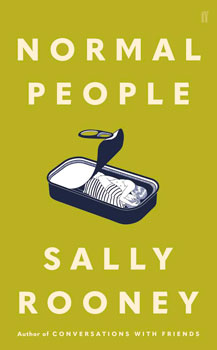Sally Rooney’s much anticipated second novel, Normal People, solidifies her position as one of the greatest voices in literature today. Long listed for the 2018 Man Booker prize, the novel follows the story of Connell and Marianne as they grapple with growing up and finding themselves while also forming a relationship with one another. As in her debut novel Conversations with Friends, Rooney’s ability to relay the intricacy and nuance of thought is ubiquitous; so much so that the Guardian has rightfully called her book ‘a future classic’.
Although the novel does not have a strong plot to follow throughout, the themes it touches on are many. One such theme is class differences; the novel begins with both characters attending secondary school together in the rural Irish town, Carricklea. Marianne is an unpopular, albeit well off girl whereas Connell is a well-liked, less well off boy whose mother cleans Marianne’s house. On the surface there appears to be no question about who is the privileged of the two.
However, as the story unfolds it becomes clear that the idea of privilege is itself worth examination. Marianne’s family life is wildly unhappy – she lives with her brother and mother, both of whom are bullies. On the other hand, Connell’s less fortunate upbringing is counteracted by the fact that his mother is a very supportive and loving woman who offers him a privilege that Marianne lacks, and spends time searching for.
They begin a relationship with one another without telling their schoolmates. The novel then jumps to their lives at the university of Dublin where they grow separately; Marianne comes out of her shell and becomes a well integrated and much respected student whereas Connell is something of an outcast suffering from deep-seated anxiety about his role there.
At first, the protagonists seem unfazed by their differences and yet as the story progresses the divergence it produces in their outlooks towards life becomes significant. One such example is Connor’s reluctance at asking to live with Marianne when he runs out of money over the summer, leading to a distancing of the two characters for some time.

Normal People by Sally Rooney | Official book cover
Another theme is the widely true, albeit under discussed, idea that the evolution of people is not linear but rather happens in a kind of jagged, uneven way. Whereas Marianne becomes herself in the intellectual context of university, Connell peaked at school and is constantly trying to go back to the comfort of having familiar surroundings and a well defined social role. The archetypal portrayal that characterises them at the beginning of the novel undergoes so much evolution that by the end the characters have virtually switched roles, contributing to both their distancing as well as their understanding of one another.
Perhaps best of all, is Rooney’s ability to encompass both characters in all their insecurities and imperfections, making it a delight in terms of character study.
Through Marianne and Connell she is able to perfectly capture a modern relationship without adhering to traditional labels that have long characterised such relationships in literature. They defy norms by rarely referring to each other as being in a relationship.
Although their context is almost inevitably romantic, they consider each other first and foremost loyal friends. And yet, though their bond is strong, it is often what they are not able to explain to each other, or what they do not give voice too, that causes their separation at various points in the novel. In this sense the characters oscillate from being strangers to being each others allies making them irrevocably intertwined in spite of their relationship status.
The misconceptions they have of each other are also prominent. The risk, and significance, of miscommunication in relationships, particularly between young people, is a topic that will be relatable to most. In the 288 pages, this is a constant battle and perhaps the most prominent character in the story.
Any reader seriously interested in these themes, and keen to understand the potential depth of human connections in the context of youth, ought to read this book. Prepare for it to consume your life while you read it and to affect your thoughts long after you finish it. It is now also being reported that the novel is being adapted for a series on the U.K television channel, BBC three.
Normal People is now available on Amazon.

